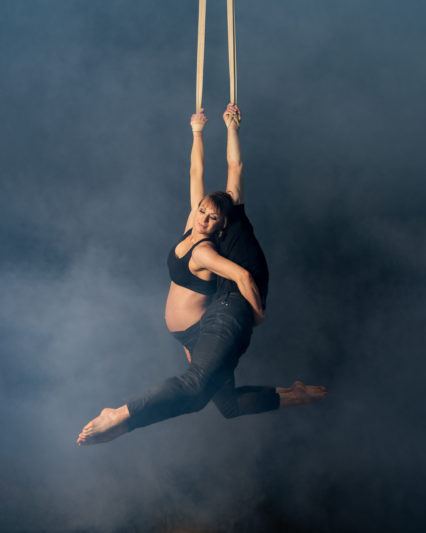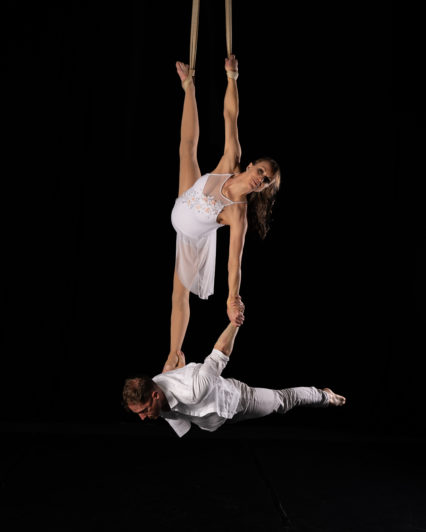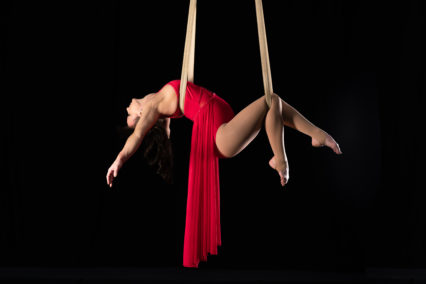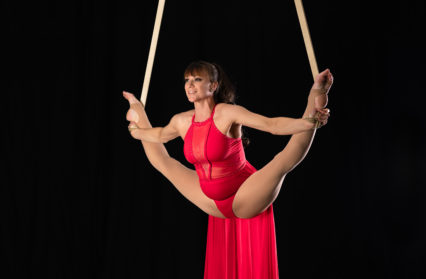In a fascinating chat about which explores the impact of pregnancy on aerial performing, Emma Schofield spoke to award-winning circus performer Beth Williams about her experience of continuing to train and perform while pregnant.
Emma Schofield: Thanks so much for taking the time to talk to me today! I wanted to start by asking you about the images you’ve been posting on Instagram of you continuing to perform and train throughout your pregnancy. From my own perspective, I looked at them and thought they were absolutely amazing, but I’m guessing keeping on performing felt natural to you…
Beth Williams: Yeah, so I’ve been in some kind of training since I was three years old, obviously that was early ballet training as a little thing, but I’ve been working my body this way for the past 37 years; it’s what I know. Pre-pandemic, I was working on board a cruise ship between 2013 and 2020, so I was in the US and I worked with 10 pairs a week. That was on top of rehearsals, or training, or me just going to the gym to keep fit. Which is to say, that I think the level of fitness that I was at pre-pregnancy, which is normal for an aerialist, was probably quite extreme and I was able to keeping on doing things which might look impressive for someone who’s not done them before. In reality, I’m only doing a very small section of what I used to do before my pregnancy.
Emma Schofield: I suppose it’s the level of fitness going into it which really counts. So, for someone like me, what you’re doing while eight months pregnant looks completely impossible, but for you, it’s normal and it must be normal for other people who do aerial performance. It’s a continuation of what you’ve worked for your whole life and your pregnancy doesn’t necessarily need to disrupt that entirely.
Beth Williams: Yeah, that’s absolutely it. I think if you’ve worked so hard for something, then it really becomes a passion. Performing is something I’ve done for years, and I’ve put everything into it. I’ve also been really lucky with my pregnancy, in that it’s been low risk and I’ve been very fit and healthy, and very comfortable. If it hadn’t been like that, maybe things would be very different and I wouldn’t be doing anything at all in the air. I’ve been so glad that I have been able to carry on, I think it’s just really good for people to keep doing things that they love.
I’m quite aware that baby is due quite soon now and life’s going to be really different and my priorities are going to shift. I think as much as you can keep a little bit of yourself, and what you like to do, then that’s so important and great for your mental health.
Emma Schofield: Definitely. I think that retaining something of yourself is so important and I guess it also helps to connect you to the pre-baby you as well.
Beth Williams: Yes, I’ve read so many things about women saying they felt really lost after having a baby. So they love their baby, and they still say that it’s the best thing that happened to them, but they’ve kind of lost themselves a bit. I hope that what I’m doing will help me to avoid that a little bit.
Emma Schofield: I can only speak from my own experience, but I can see exactly what you mean. It’s so easy to lose yourself to just being a mum; suddenly you’re there with the baby and the rest of the world just carries on around you. It’s very easy for that to completely take over and for you to lose all sense of who you were before you had the baby.
Beth Williams: Absolutely. I also think, moving forward, it’s great for your kids to see you doing stuff that you love and being yourself as well. I can be lots of things and still be a mum. Alongside the mental health benefits, there’s also the physical health, which I’ve really benefitted from with the pregnancy. I mean, I’ve obviously not been in labour before, so I don’t what it’ll be like, but I’m expecting it to be very, very strenuous, probably one of the hardest things I’ve done yet. I want to be as physically prepared for that and I want to be fit and healthy and strong afterwards. Keeping going with exercising and performing has been a great help with that.
Emma Schofield: What kind of reaction have you had to keeping on performing while you were pregnant?
Beth Williams: From family, people on social media, it’s been really amazing. I’ve had so many positive responses to the things I’ve posted. I know that’s not the case for everyone, but for me, I’ve had so many messages saying about how inspiring it is to see someone continuing to train and perform and that’s really important for me. Part of the reason I wanted to document what I was doing, was to put it out there for the next generation coming through to see what could be possible.
Emma Schofield: That positive messaging is so important. Sometimes what naturally tends to grab people’s attention, and maybe something that we understandably talk about more, are the difficulties in pregnancy and the complications, the tiredness, the challenges. We don’t necessarily talk about the positive experiences and the fact that, for a lot of people, it’s perfectly possible to carry on with their daily routine (whatever that is) while pregnant.
Beth Williams: That’s it. On my pregnancy course we’ve talked about this very thing and the fact that what you hear most are the horror stories. The thing is, I know I’m lucky, but I still have plenty of energy and, most days, I feel wonderful. Yet I sort of want to downplay that and not make other people feel bad, which I think is absolutely important to consider, but at the same time, I think both stories are equally important as well. It’s good to hear about people who have had positive experiences, as well as people who haven’t been so fortunate.

Emma Schofield: This might be a really daft question to ask, but obviously, you’ve probably gathered that I have no experience of aerial performing at all, other than coming along to shows and just being in awe of it. But how does it feel performing when pregnant? Is it a different experience to when you’re not pregnant?
Beth Williams: It is quite different in some ways. I mean, very quickly there were some tricks that I realised I couldn’t do, but I guess that’s another positive part of it, isn’t it showing that it’s possible to adapt? So rather than just saying, “oh well, I can’t, I can’t do the things I would normally do, so I can’t carry on”, I changed my repertoire and focused on the things I could still comfortably do. Instead of thinking about what you can’t do, it’s about concentrating on what you can do.
Emma Schofield: Obviously you’re getting close to the end of your pregnancy now and you’ve already said that you’re hoping that keeping going will stand you in good stead for labour and post-birth, which I’m sure it will. But what are your plans at this point in terms of returning to aerial performing afterwards? I know that’s probably a really difficult question to answer without knowing how you feel, but are you hoping to kind of get back fairly quickly into performing again?
Beth Williams: I’d like to, yeah. I think I’ve gone through this whole pregnancy accepting that I don’t know what’s going to happen next week, or next month and so far, I’ve just been able to keep going. What I don’t know is how I’ll feel afterwards, how exhausted I’ll be, so if it doesn’t feel right, I won’t do it. My baby’s the most important thing, but I’d love to get back. I’m hoping it won’t take too long, but it comes back to that idea that you know what your body’s used to. I’m of the mindset that I’m not going to force anything to happen, so there’s no pressure on me.
Emma Schofield: That’s important, trusting that you will know when the time is right for you as well, because it is such a hugely personal thing and everyone’s different. With that in mind, I wondered what you would say to other aerial performers, but also to anyone that performs in such a physical environment as part of their job, if they were thinking about going into a pregnancy and trying to keep performing throughout.
Beth Williams: Right, well I wouldn’t want to advise anyone specifically on what to do because everybody’s different, but my approach has been to listen to medical advice and I’d say that above all else. I also did lots of research, including looking at what other athletes had done, which really helped. Then I’d say, listen to your body. I think it was around the three/four month mark that I went to do a backbend and I realised that was not a good feeling and that I wasn’t comfortable doing that anymore. Yet at seven months I was still able to base my husband, to be in the straps and to hold his body was absolutely fine. That surprised me and was definitely something I didn’t think I’d be able to do.

Emma Schofield: You mention your husband, but how has it been for him? I’m guessing his experience of performing with you must have changed a little bit as well, but from the other side of the fence a bit, because obviously it’s not directly happening to his body, but he is part of that process with you.
Beth Williams: He’s been hugely supportive. Each time I’ve gone to do something he’s checked if I’m sure and I said to him at the photoshoot that I’d try to base him and we’d just see how it went. We have that relationship though, where we’re able to have that conversation and where we trust each other to not do anything silly. We’ve talked a lot about the research, and we’ve talked through the logistics of it all together. So yeah, he’s been great.
Emma Schofield: The shoot looks amazing and the photos are really powerful. How did that come about? Was it just your natural alternative to a maternity photoshoot?
Beth Williams: I’ve worked with my husband since 2013 and we’ve been doing straps since then, so it felt like something that’s very much part of who we are. I also realized, early on in my pregnancy, that I’d seen a fair number of photos of pole dance or aerial hoop photoshoots in pregnancy, but very few where people were performing on straps. When I trained, I went to the National Centre of Circus Arts and I was the second woman there to be able to discipline in straps. Before that, it was seen more as a male dominated discipline. So I thought, wouldn’t it be great to take something that is becoming more of a female discipline now and combine it with my pregnancy shoot?

Emma Schofield: That’s a lovely angle on it and is also really poignant, it sounds a bit like claiming that space as a female performer, and then as a pregnant female performer.
Beth Williams: It’s been really lovely over the sort of past, I’d say, the past ten years, just seeing the number of women train straps, it’s just growing. And that’s brilliant. And then to take it to the next stage and be able to do a pregnancy shoot using them is just great.
Emma Schofield: I imagine it’ll take time for that kind of culture to build as well, but it must help to normalise women doing straps and, in particular, continuing to train and perform, safely, throughout a healthy pregnancy.
Beth Williams: I think that’s been a big goal for me. I’m putting a lot of images and videos out there and that’s all with the aim of trying to make it that little bit more normal to train and to keep up with performing through pregnancy. While, at the same time, making sure that people understand, that pregnancy is not the best time to start learning aerial if it’s something you’ve never done before. It’s all about being sensible and listening to medical advice. You know, there’s lots of things I’d like to do – I’d love to learn to ski, but I know that now’s not the moment. It’s that balance of saying, look this is possible, but that doesn’t mean it’s right for everyone.
Emma Schofield: That message can apply to anything in pregnancy too. I mean, you mentioned runners and athletes earlier; it would be no good for them to decide to take up aerial performing when they were pregnant, but a lot of them do continue to run and it’s great to see women who are able to continue what they’re used to doing and don’t have to wrap themselves up in cotton wool for nine months.
Beth Williams: Exactly. It’s such a difficult balance; I actually lost quite a bit of work because I told potential employers, “yes, I can do the gig, yes, I’m available, but just to let you know, I will be six months pregnant at the time” – and then I would lose that gig. So it was really fantastic for me when I got the chance to be able to go up to London and perform at five months pregnant. I think it’s being aware that that’s also down to training spaces, allowing you to go in and train when you’re pregnant. It’s also in part down to people looking at you and saying “okay, I trust that you can you can do this, and it’s going to be fine”.
Emma Schofield: When you say you’ve lost gigs because of it, do you think that stems partly from fear? I’m wondering if the culture we’re in now, where people might actually be afraid of employing a pregnant woman, just in case anything goes wrong, is part of the problem?
Beth Williams: I do and I think it’s down to fear. I do completely emphasize with that and I think it is partly because, as we’ve discussed, performing aerial through pregnancy hasn’t been normal. That’s been my goal with trying to put videos and things out there; if I can just get a few people to see what I’ve been able to do, maybe at some point that will change and the fear will disappear a little bit, and we’ll be able to have conversations about it where people say “okay, so you’re pregnant, that’s fine. How should we manage it?”, rather than being afraid of it. A lot of change needs to happen, but it is possible!
You can follow Beth’s progress on Instagram, where she uses the handle @circus.beth
Photo credit – Kirk Purnell.











